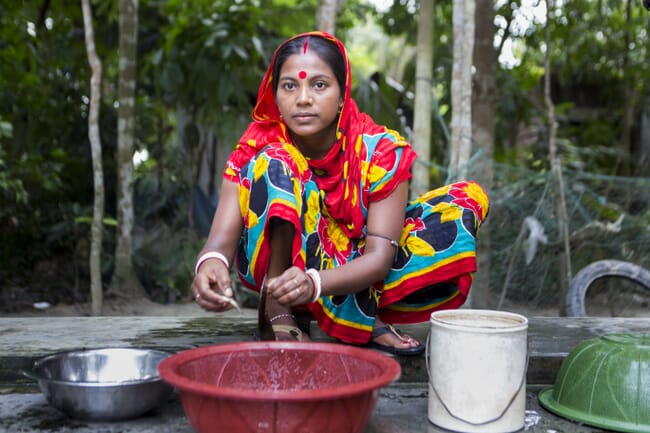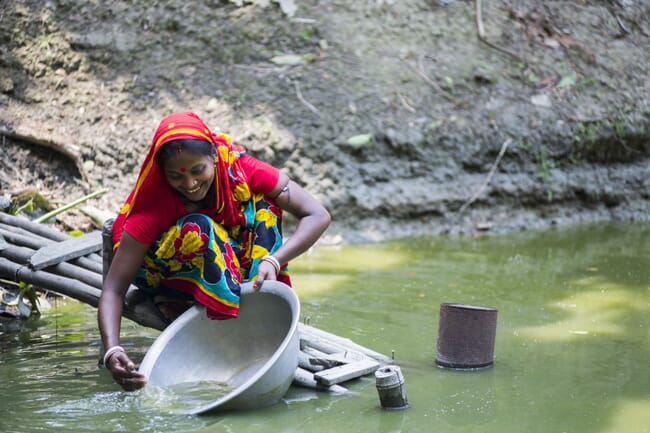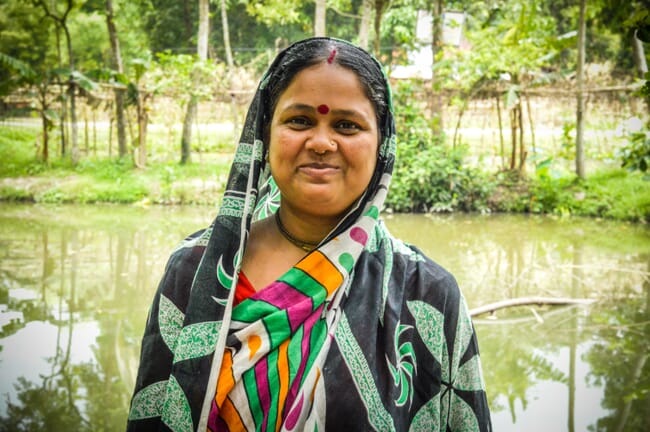A new report on Bangladeshi women working in both homestead pond production and shrimp-processing factories highlights how they experience empowerment through the income this generates. The report, by WorldFish and FAO, says that for younger, single or unmarried factory women, salaries are an economic lifeline. In Bangladesh, women tend to be seen as a burden and are married off at a young age, while, explained Afrina Choudhury of WorldFish, “many abandoned women find it difficult to be accepted back into their parental home, especially when they are poor”.

© WorldFish
Some women working in fish-processing factories are bucking these trends, the report finds, because “they were not seen as a burden, but rather as being able to contribute to their family by virtue of having a salary”. Women in homesteads, however, do not receive an income – which may in part explain why empowerment opportunities differ in nature between homesteaders and factory workers.
Those producing fish at home spoke of opportunities that aligned with traditional women’s roles, such as being able to choose nutritious fish to feed their family and guests without the economic costs. With homestead ponds owned by the women’s husbands or by multiple blood-related brothers and their families, Choudhury observed that it is “difficult for [the women] to aspire beyond the immediate consumption benefits that the pond is providing”. Although factory workers also spoke about contributing towards their families’ wellbeing, they also discussed their aspirations for themselves and their children, such as using their income to purchase land. Another key influence of the women’s experiences seems to come down to the location of their home and work.
“While ponds are in the vicinity of the home, the women who engaged in the factory work were de facto stretching social (gender) boundaries somewhat in terms of their mobility,” WorldFish’s Cynthia McDougall explained. Crucially, combined with the factory income, this has had an impact on the attitudes of some women’s husbands towards traditional domestic roles.
“In the factory case, some men are actually breaking normative expectations by helping out in domestic chores because they know the women are away, earning a living and helping them by earning money. In the pond case, the pond being within the vicinity of the home means that there is a social perception that women have ‘no excuse’ to fall short on the household responsibilities that are ascribed to them,” said Choudhury.
Training changes attitudes
It is worth noting that, while older untrained homesteaders were accepting of their stereotyped roles, those with training in domestic fish production expressed desires to address gender imbalances.
Bangladesh’s female aquaculture practitioners still face significant obstacles preventing them from having the freedom to make their own life choices on a par with men. In factories, women experience what McDougall describes as the “sticky floor”.

© WorldFish
“While factories have allowed women more economic freedom, at this stage it is predominantly still through low-paying, low-quality, relatively undesirable jobs with little opportunity for more professionally challenging, better-paid leadership roles,” she observed.
Simply put, women are not allowed to become supervisors. “We do good work, they praise us but they will not praise us too much because then they will have to promote us,” one female factory worker told WorldFish. In homestead situations, women may be allowed to take care of the pond while men are away but generally do not have the freedom to take up the roles that are considered men’s work – more physical roles, those beyond the homestead, or roles that take the lead in trying out new approaches.
Given that since 1991 the prime ministers of Bangladesh have all been women, the notion of male-only supervisors might seem strange.
“Social and gender constraints and women’s vulnerability in Bangladesh vary by wealth, education, religion, experience, age, location and much more,” Choudhury explained, noting that the wealthier or more educated the family a woman comes from, the greater access to resources and decision-making powers she may have. In both homestead and factory settings, women are regarded as inferior by men.
This attitude is underscored by one factory male, who stated, “Men are stronger and smarter than women,” while a homestead woman reflected that “we have to give men priority and respect. We women have to be careful that people do not talk and their respect isn’t destroyed”.

© WorldFish
Although aquaculture has contributed to women’s empowerment, and holds enormous potential to increase this as the sector grows, it does not automatically guarantee empowerment.
“We shouldn’t mistake involvement in training or even earning an income with substantive or sustained empowerment or wellbeing,” McDougall emphasised. “Women’s empowerment – and the associated impact on poverty reduction and wellbeing – relies on investment and thoughtful engagement in building a lasting foundation for gender equity and equality”.
For aquaculture and development programmes seeking to empower women, this means they too need to step out of their traditional roles and start engaging both men and women to shift underlying gender barriers.


